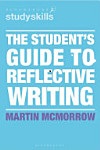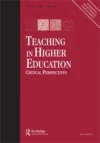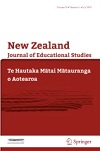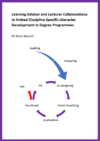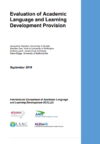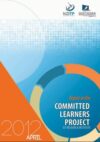Member publications
Research by members
This area of the website is devoted to publications by ATLAANZ members that are relevant to our profession as Tertiary Learning Advisors. Follow the links below to view the range of publications produced by ATLAANZ members.
This study examines the impact of environmental sensitivity on student success in postsecondary education. A mixed-methods approach was employed, including two surveys and interviews, to develop and validate a self-report measure and explore sensitivity’s role in learning. Results showed that high sensitivity is positively associated with success-promoting strategies but also challenges, like sensory overload. The study recommends increasing awareness about environmental sensitivity, flexible teaching, and institutional support to enhance the learning experience for sensitive students.
From your studies to your career, reflection and reflective writing is a key skill for personal and professional development. However, reflective writing requires a different approach to essays or reports – it can be difficult to know how to accomplish it. Written in a supportive and inclusive tone, The Student’s Guide to Reflective Writing is an ideal resource for anyone faced with reflective writing assignments. It provides clear and practical advice on every step of the process, showing you how to:
– Record your experiences
– Choose what to write about
– Structure your assignment
– Write reflectively using appropriate tone and language; and
– Incorporate theory and refer to professional skills and competencies
Throughout the book, there are a wealth of practice tasks and detailed examples of reflective writing from a range of disciplines. It also contains a glossary of sentence structures to help you get started and build your confidence. This hands-on and supportive guide equips you with the skills to write critically, reflectively and successfully.
In a call to action, two learning advisors at AUT have conducted a systematic literature review of empirical research that reports on the impact of embedded approaches to academic literacy development. Of twenty studies that met the inclusion criteria and quality appraisal, our analysis focused on the studies’ research designs, types of evidence presented, pedagogic practices articulated, and where the work was published. Findings of the review reveal: a preponderance of student and staff perceptions data generated from questionnaires, interviews, and focus groups; limited descriptions of pedagogic practices that were not always connected with claims made about the impact of those practices; and publication in various disciplines. Recommendations include a need for cross-disciplinary collaboration that draws on both the knowledge of learning advisors and the knowledge of lecturers to design research studies that triangulate data about perceptions with other forms of data, such as student academic performance, among others. If the value of embedded approaches is to be made clearer to institutional leaders and disciplinary teaching staff, some of our publications need to present more persuasive evidence of their impact. If learning advisors are to further establish embedding as a field of practice and research, some of our other publications need to specify how we do it (i.e., the pedagogic practices that are effective for embedding). https://doi.org/10.1080/13562517.2024.2354280
As elsewhere in the world, academic misconduct is a serious problem in Aotearoa. Yet, beyond the occasional newspaper headline, we know relatively little about the extent of the problem here or the factors associated with it. Consequently, our educational leaders and practitioners are left under-informed as they seek to address the problem and promote academic integrity. To help provide the knowledge and insights needed to craft good policy and best practice, the Research on Academic Integrity in New Zealand (RAINZ) Project—a research collaboration involving eight tertiary institutions—was founded in 2021. In the second semester of 2022, the RAINZ Project launched the first-ever nationwide survey of undergraduate students’ perceptions, attitudes, and behaviours related to academic integrity. Results from this survey, which was completed by undergraduates (N=4493), indicate that most students (approximately two-thirds) reported engaging in at least one form of academic misconduct in the past year. As hypothesised, students’ perceptions (of the institutional climate and peer norms) and moral attitudes (related to cheating) were signifcantly associated with their engagement in academic misconduct. Details of these results as well as their implications for policy and practice are discussed. https://doi.org/10.1007/s40841-024-00315-9
The Learning Advisor team & co-researchers in the School of Education at AUT have a new journal article out in Teaching in Higher Education. It’s about academic literacy specialists potentially ‘getting stuck’ teaching in a limited number of tertiary courses and programs. We explore issues and options for co-creating and then gradually ‘handing over’ literacy teaching to lecturers. We also investigate relationships between what is taught and who does the teaching on assessment task resubmission rates and the distribution of grades. https://doi.org/10.1080/13562517.2022.2048369
This doctoral research sought to identify a sustainable collaborative model for programme-level embedded literacies development. It is a response to more traditional approaches that position literacy development as ‘support’ for only specific groups of students and as adjunct to the core curriculum. The main finding of the research is a proposed collaborative model for literacy specialists (learning advisors and liaison librarians) and discipline content specialists (lecturers): the Programme-wide Collaborative Model of Embedding Literacies Development. Contact Mark at mark.bassett@aut.ac.nz
A project of the International Consortium of Academic Language and Learning Development (ICALLD) to examine the work of language and learning practitioners, using an evaluation framework constructed for this purpose. The intention is to provide an evaluation framework for member associations and institutions when evaluating their practice. ICALLD_Evaluation_Report__final_Hamilton-et-al_(September2019)
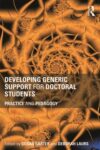
Carter, S. and Laurs, D. (2014). Developing generic support for doctoral students: Practice and pedagogy. Routledge.
In response to the global imperative for increased doctoral completions, universities around the world are recognising the potential for generic support to complement subject-specific supervision. This multidisciplinary, multi-voiced book (with contributions from practitioners working and researching in the USA, UK, UAE, Australia and New Zealand) explores the opportunities and challenges of providing campus-wide support for PhD students. As well as detailing programmes and workshops that address specific needs, the book highlights the often precarious positioning of learning centres, exhorting TLAs to showcase their work within the wider institutional setting at every opportunity.
The book is available for purchase (in both hardback & paperback) from Routledge.
The aim of the Committed Learners Project (CLP) is to identify practices to foster student engagement, improve student retention and enhance successful completion of programmes. This project involved three phases:
- A review of the literature relating to student engagement
- A questionnaire distributed to a variety of staff employed at ITPs, including those in administrative and management roles
- Interviews with teaching staff and those involved in learning support.
Download this report as a PDF from ResearchGate


